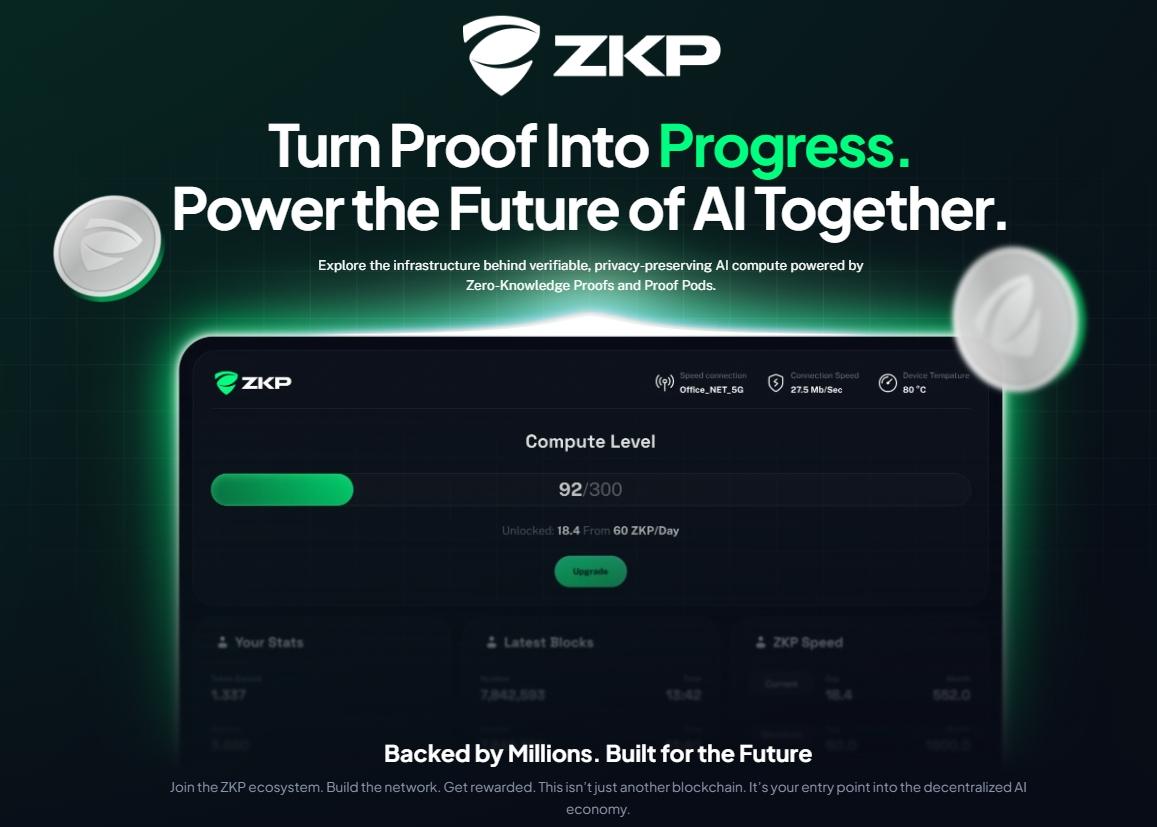How Proof Pods Let You Join AI Without Sacrificing Privacy?

Data is power. In the AI world, it often feels like you must give up identity, personal details, or privacy just to participate. Whether you’re contributing bandwidth, compute, or insights, many systems require exposure along with input. But there’s a different path one where you can contribute meaningfully, be rewarded, and keep your identity intact.
That different path is made possible by zero-knowledge proof crypto, a cryptographic framework that allows someone to prove they completed a task or contributed resources without ever revealing who they are or what exactly they shared. Instead of handing over personal data, you hand over verifiable proof proof that your resource usage or contributions are real. That becomes the currency instead of your identity.
What Proof Pods Are and What They Enable?
Proof Pods are purpose-built hardware devices designed for people who care about privacy. They let early adopters plug into an AI ecosystem and contribute in ways like compute power, data hosting, or helping with secure processing. The Pod runs quietly, doing its part in the background; its job is to enable, not expose.
On a personal dashboard, you’ll see your involvement: how many tasks you’ve helped complete, what your contributions in compute or data have amounted to, and what rewards you’ve earned. But behind the scenes, identity stays separate. The system is built so you control what data you share, how much you show, and what remains completely private. Privacy isn’t something to opt into it’s something to be preserved.
The Foundations: Architecture That Guards Privacy
Proof Pods are supported by a layered, modular system where each layer is intentional about privacy, efficiency, and trust. Here’s how it holds up:
-
Contribution Verification without Identity Exposure: The system checks that the resource provided—whether compute, bandwidth, or storage—is valid. But it doesn’t tie that resource to a personal identity.
-
Developer Flexibility: Builders can use familiar environments—smart contract frameworks, runtime support, interfaces—without forcing users to give up privacy.
-
Confidential Compute Tools: Using methods from zero-knowledge proof crypto (like succinct proofs such as zk-SNARKs or zk-STARKs), the system can verify tasks without requiring underlying data. It’s like proving you solved a puzzle without showing the puzzle itself.
-
Scalable Off-chain Storage & Secure Data Handling: Storage isn’t centralized. Data, when used, is anchored via integrity proofs and stored in ways that avoid exposure, leveraging decentralized storage networks with privacy guards.
Together, these components build something robust: where privacy is a design constraint, not a tradeoff.
Real-World Ways This Privacy Breeds Possibility
Privacy is often framed as friction but in many areas, it’s the thing that unlocks better collaboration, trust, and innovation. Here are several scenarios where Proof Pods and this architecture make real difference:
Healthcare Insights Without Breached Privacy
Think of medical institutes wanting to build AI models for diagnostics or early disease detection. Currently, patient confidentiality is a major barrier to data sharing. With Proof Pods, institutions could contribute that compute or anonymized data, use verifiable proofs so that models are valid, yet never expose individual patient records.
Enterprises Innovating Securely
Companies often have useful data or compute resources but are wary of leaks or exposure of proprietary information. Using privacy-preserving protocols and anonymous contribution, firms can collaborate without revealing trade secrets. The value they add is validated by proofs, not by identity disclosure.
Citizen Contributors & Small-Scale Participation
You don’t need to be a big tech company to help power AI. If you have spare compute power at home, or idle bandwidth, a Proof Pod lets you contribute. Small contributors become part of something larger: you see your contribution, earn rewards, share in impact all while staying anonymous.
Oversight and Trust Without Surveillance
Regulators, auditors, or ethics boards often need to verify fairness, compliance, or safety in AI systems. But that doesn’t always require hands-on access to training data. With proof mechanisms, oversight can get what it needs verification of behavior without privacy being compromised.
Rewards, Fairness, and Ethical Design
For such an ecosystem to succeed, it must be fair, transparent, and sustainable. It’s not enough to protect privacy; the system also has to reward contributors, respect their conditions, and avoid unintended negative consequences.
-
Fair Reward Models: Contributors should be rewarded in proportion to what they add—whether large or small. The token or incentive model must ensure people with less powerful hardware or limited connectivity still have a meaningful path.
-
Transparency & Consent: Users should choose what they share. The UI/UX dashboards must clearly show what is optional, what is required, and what impact each decision has. Privacy policies and data handling need to be clearly disclosed and user-friendly.
-
Energy Efficiency: AI and compute tasks consume power. Proof Pods and the supporting infrastructure need to focus on minimizing waste, using efficient algorithms, and ideally integrating renewable energy or green infrastructure where feasible.
-
Community Governance: Contributors should have voice in how rules evolve privacy settings, reward distribution, what tasks are prioritized. That helps make the system resilient, trusted, and aligned with the values of its participants.
Challenges and What Must Be Solved
Building toward this vision isn’t easy. There are technical, social, and practical challenges that demand attention:
-
Cryptographic Proof Overhead: Generating proofs in zero-knowledge systems can require sizable computational effort. Minimizing latency, energy consumption, and resource demand is essential so that nothing becomes prohibitive for ordinary users.
-
Device Access & Resource Inequality: Not everyone has high-end devices or stable internet. Ensuring lower-resource environments are supported is key to building inclusive participation.
-
User Trust: Privacy claims are only as good as their real-world implementation. Audits, open-source tools, and frequent reporting help ensure the privacy guarantees are not just promises.
-
Scaling with Integrity: As more participants, tasks, and data types are added, maintaining privacy, performance, and verification speed will require robust engineering, resilient network design, and careful system architecture.
Roadmap: Building Together Toward Scale
From what is understood, here’s how the ecosystem plans to grow, step by step:
-
Prototype & Early Adopter Phase: Distribute Proof Pods to users who care most about privacy. Gather feedback. Refine hardware, dashboard UI, contribution metrics.
-
Reward and Contribution Integration: Launch the earnings model, where contributors begin receiving incentives for their computational or data contributions. Establish clarity on what proofs look like and how rewards tie to contributions.
-
Expanding Use Cases: Bring in specific AI tasks whether for research, creative AI, or private data modeling that respect contributor privacy. Onboard partnerships in healthcare, science, or ethical AI.
-
Governance & Community Empowerment: Give contributors tools to influence policy: decide what privacy levels, opt-in choices, and reward distributions should look like. Build ambassador programs.
-
Scaling Infrastructure & Interoperability: As the user base grows, ensure systems remain fast, secure, and private. Expand compatibility with developer tools and protocols. Make contribution seamless, even for those with modest setups.
Why This Path Feels Human?
When you step away from the tech, the promise here is deeply human:
-
Dignity in Participation: You contribute without feeling vulnerable or exposed.
-
Recognition without Identity: What you do matters not who you are.
-
Control over Your Data: You decide how much you share, when, and with whom.
-
Shared Purpose: You’re part of something bigger a collective powering AI responsibly.
A Glimpse Into Possible Futures
Imagine thousands of people around the world students, researchers, enthusiasts each running a Proof Pod. The aggregated compute helps AI models that predict climate trends, support medical diagnostics in underserved regions, or provide creative tools. And all that happens while no one loses their privacy.
Imagine regulators checking fairness of such AI models via proofs not by sifting through raw user data. Imagine companies collaborating across borders, contributing resources, yet protecting their core IP. The ecosystem becomes not just about technology but about trust, respect, and shared ownership.
Final Thoughts: Contribution Without Compromise
AI’s future doesn’t have to force us to give up privacy. With architectures built around zero-knowledge proof crypto, and devices like Proof Pods that put control into individuals’ hands, there’s a way to join the AI journey without revealing more than you want.
It’s a future where contribution, reward, and anonymity coexist; where impact is seen, but identity is safe; where innovation and integrity walk side by side.





